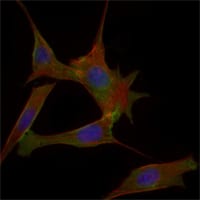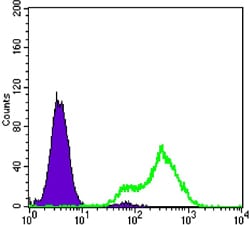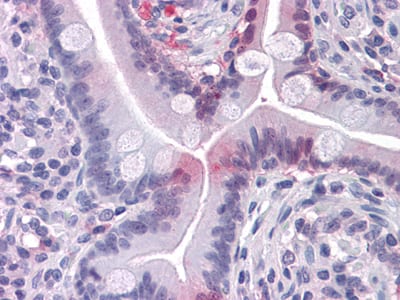


| WB | 咨询技术 | Human,Mouse,Rat |
| IF | 咨询技术 | Human,Mouse,Rat |
| IHC | 1/25-1/100 | Human,Mouse,Rat |
| ICC | 技术咨询 | Human,Mouse,Rat |
| FCM | 咨询技术 | Human,Mouse,Rat |
| Elisa | 1/1000-1/2000 | Human,Mouse,Rat |
| Aliases | FABPI; I-FABP; MGC133132; FABP2 |
| Entrez GeneID | 2169 |
| clone | 9A9B7B3 |
| WB Predicted band size | 15kDa |
| Host/Isotype | Mouse IgG1 |
| Antibody Type | Primary antibody |
| Storage | Store at 4°C short term. Aliquot and store at -20°C long term. Avoid freeze/thaw cycles. |
| Species Reactivity | Human |
| Immunogen | Purified recombinant fragment of human FABP2 expressed in E. Coli. |
| Formulation | Ascitic fluid containing 0.03% sodium azide. |
+ +
以下是3篇涉及ZMIZ1抗体应用的参考文献摘要概括(基于公开文献信息整合,具体引用请核对原文):
---
1. **文献名称**: *ZMIZ1 enhances tumorigenesis and immune evasion in triple-negative breast cancer*
**作者**: Li X, et al.
**摘要**: 研究通过Western blot和免疫组化(使用兔源ZMIZ1抗体)证明ZMIZ1在TNBC组织中高表达,并通过调控PD-L1促进肿瘤免疫逃逸。
---
2. **文献名称**: *ZMIZ1 interacts with androgen receptor to promote prostate cancer progression*
**作者**: Wang H, et al.
**摘要**: 利用小鼠单克隆ZMIZ1抗体进行免疫共沉淀实验,发现ZMIZ1与雄激素受体直接结合,激活下游信号通路驱动前列腺癌转移。
---
3. **文献名称**: *ZMIZ1 mutations cause a novel neurodevelopmental disorder*
**作者**: Maddirevula S, et al.
**摘要**: 通过免疫荧光(使用抗ZMIZ1多克隆抗体)分析患者细胞,发现ZMIZ1突变导致其核定位异常,影响神经发育相关基因表达。
---
(注:若需具体文献DOI或补充检索,可提供研究方向或数据库访问权限进一步筛选。)
ZMIZ1 (Zinc Finger MIZ-Type Containing 1) is a protein encoded by the ZMIZ1 gene, belonging to the PIAS (Protein Inhibitor of Activated STAT) family. It functions as a transcriptional coactivator, interacting with various signaling pathways, including TGF-β, Wnt, and androgen receptor (AR)-mediated signaling. ZMIZ1 contains a conserved MIZ (MIZUCHI) domain and a proline-rich region, enabling its role in regulating transcription, protein-protein interactions, and post-translational modifications. Studies link ZMIZ1 to cell proliferation, differentiation, and apoptosis, with implications in cancer, immune disorders, and neurodevelopmental conditions.
ZMIZ1 antibodies are immunological tools designed to detect and study the expression, localization, and functional roles of ZMIZ1 in biological systems. These antibodies are commonly used in techniques like Western blotting, immunohistochemistry (IHC), immunofluorescence (IF), and co-immunoprecipitation (Co-IP). They help researchers investigate ZMIZ1's involvement in diseases, such as its overexpression in certain cancers (e.g., breast, prostate) or its regulatory role in autoimmune diseases. Some antibodies target specific epitopes or post-translationally modified forms of ZMIZ1. enabling detailed mechanistic studies. Validation via knockout/knockdown models or recombinant protein controls is critical to ensure specificity. Commercial ZMIZ1 antibodies are available from multiple suppliers, often developed in hosts like rabbits or mice, with varying clonal properties (monoclonal/polyclonal). Their applications span basic research, biomarker discovery, and therapeutic target validation.
×